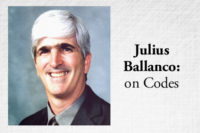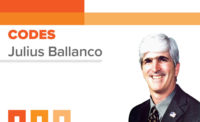
ICC members are provided with a CD-ROM of all new codes when they are issued. The I-Quest is the ICC's top-of-the-line electronic version. Photo courtesy ICC
One of the beauties of today’s electronic age is the use of electronic codes and standards. I will admit I still like my book version of the codes and some standards. However, the electronic versions are nice to use as well.
The biggest benefit to the electronic codes and standards is you can take them along without carrying all the weight. Code books get heavy in a briefcase.
The other beauty is, when you want to reference a section in a report, it’s easy to copy and paste that particular section. In the good old days, you had to retype all of the text of the section you were referencing.
And when you are not completely familiar with a document, the various electronic versions have a search function that will find the requirements in the code or standard. Some search functions are basic, while others are super-advanced.
I am often asked about the quality of each organization’s electronic version of their codes or standards. Are they any good? Do the search functions work? Are they worth the price? While I have avoided writing about this in the past, I thought it might be beneficial to give a brief overview (in no particular order).
ICC
If you are a member of ICC, they provide a CD-ROM of all the new codes when they are issued. The CD-ROM loads all codes on your computer and requires a password to gain access. Your computer receives an authorization over the Internet to use the codes.The problem with this is if a virus makes it through to your computer, which has happened to me three times, the registry disappears immediately. For some reason, I have found the ICC registry to be under constant attack. While my other programs still work, I end up spending about 20 minutes on the phone with ICC trying to straighten out the password so I can use the program again.
The ICC CD-ROM can also be used on two computers by the same member. I have the codes on my office computer and on my notebook computer. They are very convenient and in simple PDF document form. You can copy and paste text from various sections. However, don’t try to copy a table or a photograph. The copy turns to trash. If you have the full version of Adobe Acrobat, you can always take a snapshot of any table and drop that into a report or document.
The search function is the basic Adobe word search, which I have found to be very useful. You can find information on the membership benefits, along with the free CD-ROM, atwww.iccsafe.org.
ICC also has certain codes available for viewing online (free of charge). Included with the online free codes are various state versions of the International Codes. I find that to be extremely useful.
ICC also has a top-of-the-line electronic version called I-Quest, which has a great search engine. You can also bookmark sections of the code you are always using. But be ready to pay for the quality.To review the I-Quest codes, go towww.iccsafe.org/store.
IAPMO
IAPMO has a simple electronic version of the Uniform Plumbing Code and Uniform Mechanical Code available on CD-ROM in PDF format (relying on the Adobe Acrobat search function). The beauty of the CD-ROM is there is no registration required. You don’t have to worry about the program not working.What I do and don’t like about the program is that each chapter comes up separately. This is a pain at times when you want to go from one chapter to the next. However, it’s great when you want to look at multiple code sections at the same time because you can open up different chapters. Again, there are pluses and minuses. Once I got used to it, I found it to be great.
Another appealing aspect of the IAPMO CD-ROM is affordability (costs less than the printed books). You can find information on the IAPMO electronic codes at www.iapmo.org/Pages/2009UniformCodes.aspx.
NFPA
The final electronic product is the NFPA Standards. Clearly, NFPA went from first to worst in the category of electronic standards. For a number of years, you purchased a DVD that had all the NFPA Standards included. The DVD was easy to use and included an excellent search function.The only problem was you needed to have the DVD in your computer, an aspect I actually liked. I could pop it out of my office computer and take it with me in my notebook computer.
Unfortunately, NFPA abandoned the DVD last year. They replaced it with a lousy online service. You have to be online to access any NFPA standards. And when you are in a remote location, it can take forever to pull up a standard.
On a positive note, one of the nice aspects of the online service is you can download older versions of the standards. This is helpful when writing reports on existing buildings. You don’t have to search the bookshelf. Instead, you can reference the online document.
The online service also allows you to download the standards onto your computer. I downloaded approximately 30 of the most-used NFPA standards. This was a nice feature until I realized that NFPA loaded a time bomb on each document.
I rudely found this out when I was writing a report on Jan. 3 of this year. My subscription ran out Jan. 1. Since I hadn’t used the program that much and I had the most commonly used standards downloaded to my computer, I decided not to renew for the time being. After all, the electronic program costs almost $1,000 and these are tough economic times.
Well, on Jan. 3, when I went to open the file, I received the following message, “Your NFCSS subscription has expired. Please contact NFPA customer support.” All I thought was, “What a rip-off.” You pay $900-plus to use standards for a year. You are better off buying the books for the same price. At least on Jan. 3 you can still pull the standard off the bookshelf.
If you are wondering what I did, I put the DVD from the previous year in my computer and used that.
My recommendation is to not buy the NFPA online standards unless you want to spend money every year. Maybe one of these days they will bring back the DVD. In the meantime, the next time I need NFPA standards, I’ll buy the loose-leaf binder. If I need something electronically, I’ll simply scan the page I need. To review the NFPA online service, you can go towww.nfpa.org/catalog.


